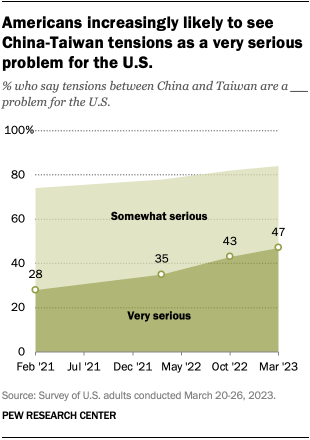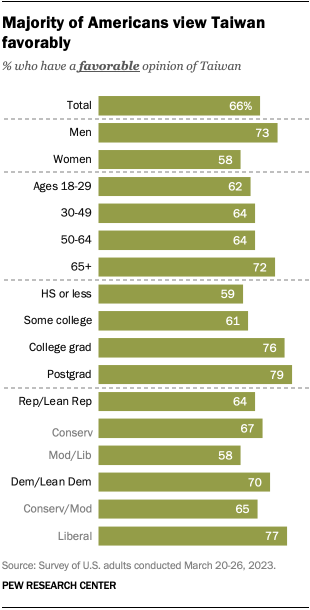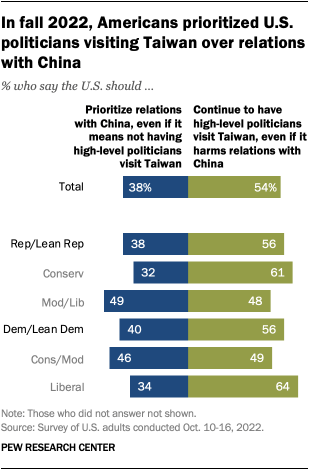
A growing share of Americans are concerned about tensions between China and Taiwan, according to a Pew Research Center survey conducted March 20-26, 2023. Nearly half of U.S. adults (47%) say tensions between mainland China and Taiwan are a very serious problem for the United States, up 4 percentage points since October 2022 and 19 points since February 2021.
The survey comes as Taiwan President Tsai Ing-wen visits the U.S., with unofficial stops planned in New York and in California, where she is scheduled to meet with U.S. House Speaker Kevin McCarthy. A spokesperson for China’s foreign ministry has said it “strongly opposes” all forms of U.S. contact with Taiwan officials.
Pew Research Center conducted this study to examine American attitudes toward Taiwan and its relationship with mainland China. For this analysis, we surveyed 3,576 U.S. adults from March 20-26, 2023. Everyone who took part in this survey is a member of the Center’s American Trends Panel (ATP), an online survey panel that is recruited through national, random sampling of residential addresses. This way nearly all U.S. adults have a chance of selection. The survey is weighted to be representative of the U.S. adult population by gender, race, ethnicity, partisan affiliation, education and other categories. Read more about the ATP’s methodology.
Here are the questions used for this analysis, along with responses, and its methodology.
Among the U.S. public, Republicans and Republican-leaning independents are somewhat more likely than Democrats and Democratic leaners to be very concerned about tensions between China and Taiwan (52% vs. 45%). Conservative Republicans are more likely than moderate or liberal Republicans (61% vs. 38%) to see these tensions as a very serious problem.
Men are more likely than women to say tensions between China and Taiwan pose a very serious problem to the U.S., as are older Americans and those with more education when compared with younger Americans and those with less education. It’s important to note that men and those with at least some college education are also more likely than their counterparts to provide a response to this question.
Most Americans have a favorable opinion of Taiwan

In contrast with the extremely negative views Americans have of China, the U.S. public tends to see Taiwan in a favorable light. About two-thirds of Americans (66%) say they have a positive opinion of Taiwan, including 11% who have a very favorable view, according to the same survey.
Americans who have a favorable view of Taiwan are more likely to be concerned about tensions between mainland China and Taiwan. Among U.S. adults who see Taiwan favorably, 55% say cross-strait tensions are a very serious problem for the U.S. Among those who see Taiwan in a negative light, 32% perceive these tensions as a very serious problem for the U.S.
Democrats see Taiwan in a somewhat more positive light than Republicans do (70% vs. 64%). Differences within the parties persist on this question, too. Liberal Democrats are more likely than conservative or moderate Democrats (77% vs. 65%) to view Taiwan favorably, and conservative Republicans are more likely than moderate and liberal Republicans (67% vs. 58%) to do so.
Men are more likely than women to see Taiwan favorably, as are those with more education. About three-quarters or more of Americans with a bachelor’s degree (76%) or postgraduate degree (79%) have a favorable opinion of Taiwan, compared with about six-in-ten of those who have some college education or less. (Men and those with a college degree are also more likely to offer a response to this question.)
Older Americans also see Taiwan more favorably than younger Americans do. About seven-in-ten Americans ages 65 and older (72%) report a favorable opinion of Taiwan, compared with smaller majorities of those in younger age groups.
McCarthy, the U.S. House speaker, plans to meet Taiwan’s president in California this month, but he has not ruled out the possibility of visiting Taiwan.

In previous Pew Research Center polling, Americans generally looked favorably on the prospect of such a visit. In October 2022, shortly after then-House Speaker Nancy Pelosi visited Taiwan, 54% of Americans said the U.S. should continue to have high-level politicians visit Taiwan, even if it harms bilateral relations with China. In contrast, 38% said the U.S. should prioritize relations with China rather than send politicians to Taiwan.
Though U.S. political dynamics may have shifted since then, there were no partisan differences in Americans’ opinions of how the U.S. should approach future diplomatic travel to Taiwan. Republicans were as likely as Democrats (56% each) to prioritize U.S. officials visiting Taiwan. Conservative Republicans and liberal Democrats again stood out relative to moderates in each party as more likely to say the U.S. should continue to have high-level visits to Taiwan, even at the expense of relations with China.
Note: Here are the questions used for this analysis, along with responses, and its methodology.



